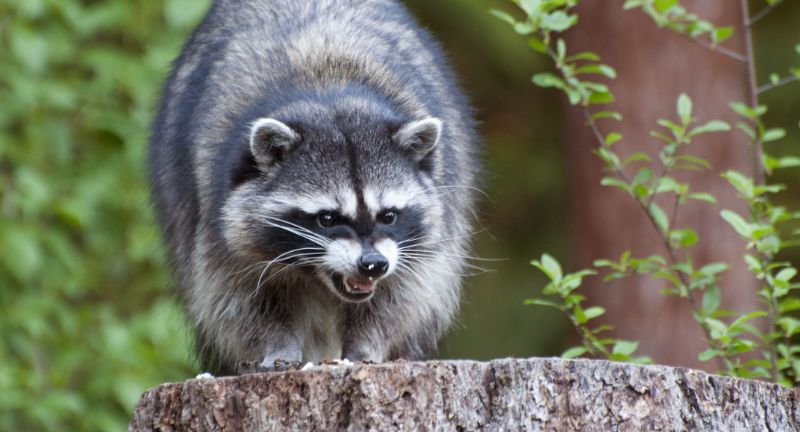NEWS
23 Intriguing Things To Know About Raccoons In America
Published
2 months agoon

Shutterstock
Raccoons are one of the most fascinating creatures native to North America, known for their intelligence and adaptability. These masked mammals often captivate people with their curious behaviors and unique physical features. In this article, we’ll explore intriguing facts about raccoons, shedding light on what makes them such remarkable animals. From their habitats to their surprising skills, each slide reveals a new and exciting aspect of these clever critters.
Raccoons Have Excellent Night Vision

Shutterstock
Raccoons are primarily nocturnal, and their excellent night vision helps them navigate the dark with ease. Their eyes are equipped with a special layer called the tapetum lucidum, which reflects light and enhances their vision. This adaptation allows raccoons to forage efficiently at night, even in low-light environments. Their ability to see well in the dark contributes significantly to their survival in the wild.
They Have Highly Dexterous Paws

Shutterstock
Raccoons are known for their nimble paws, which resemble tiny human hands. These paws allow them to grasp, manipulate, and open objects with surprising skill. This dexterity is why raccoons are often seen opening garbage bins or picking up small items. Their paws also help them catch prey and climb trees with ease.
Raccoons Are Omnivores

Shutterstock
Raccoons have a versatile diet, making them highly adaptable to various environments. They eat fruits, nuts, insects, small animals, and even human food scraps. This dietary flexibility helps raccoons thrive in urban areas as well as natural habitats. Their ability to eat a wide range of food is one reason they are so successful in many ecosystems.
They Wash Their Food Before Eating

Shutterstock
One of the most peculiar behaviors of raccoons is their tendency to “wash” their food. While this behavior is not fully understood, it is believed to help them soften or clean their meals. Raccoons often dunk their food in water before consuming it, which has earned them the nickname “washing bears” in some languages. This unique trait adds to their charm and mystique.
Raccoons Are Excellent Climbers

Shutterstock
Raccoons possess strong claws and flexible joints, making them exceptional climbers. They can scale trees, fences, and even buildings with remarkable agility. This skill allows them to evade predators and reach food sources in high places. Their climbing abilities are essential for their survival and adaptability in diverse habitats.
Raccoons Are Intelligent Problem-Solvers

Shutterstock
Raccoons are known for their problem-solving abilities, which rival those of some primates. Studies have shown that raccoons can remember solutions to puzzles and even improve their efficiency over time. This intelligence allows them to adapt to new environments and exploit resources effectively. Their cleverness often surprises researchers and onlookers alike.
They Can Open Complex Locks

Shutterstock
Raccoons have been observed unlocking complex mechanisms, including latches and locks. Their combination of intelligence and dexterity enables them to access food and shelter in ways other animals cannot. This skill has earned them a reputation as crafty intruders in urban settings. Researchers have tested raccoons’ lock-picking abilities, and they often excel in such challenges.
They Are Highly Adaptable to Urban Life

Shutterstock
Raccoons have made themselves at home in cities across North America. They use their intelligence to navigate human-made environments, often thriving where other wildlife struggles. Urban raccoons forage for food in garbage cans and find shelter in attics, chimneys, and abandoned buildings. Their adaptability makes them one of the most successful urban mammals.
Raccoons Use a Variety of Vocalizations

Shutterstock
Raccoons communicate using a range of vocalizations, including chirps, growls, and screams. These sounds convey messages about danger, food, or social interactions. Mother raccoons often use vocalizations to call their young, ensuring their safety. This wide repertoire of sounds highlights their social and emotional complexity.
Raccoons Are Social Animals

Shutterstock
Raccoons often live in family groups, especially during the breeding season. These groups help provide protection and guidance for the young. Male raccoons are typically solitary, but females are more social and interact with their offspring regularly. These social interactions help raccoons adapt to their environments and thrive in diverse settings.
Raccoons Have Distinct Facial Masks

Shutterstock
One of the most recognizable features of raccoons is their black facial mask. This distinct marking not only gives them a mischievous appearance but also helps reduce glare and enhance their vision. The mask is especially useful for nocturnal activities, allowing them to see more clearly in low-light conditions. It also plays a role in their communication, as it emphasizes their facial expressions.
They Can Swim Long Distances

Shutterstock
Raccoons are surprisingly good swimmers, capable of covering long distances in water. They use their strong limbs and webbed toes to navigate rivers, lakes, and ponds. Swimming helps them access food sources such as fish and amphibians, and it provides an escape route from predators. Their aquatic abilities demonstrate their adaptability to various environments.
Raccoons Have a Strong Sense of Smell

Shutterstock
Raccoons rely heavily on their keen sense of smell to locate food and navigate their surroundings. Their sensitive noses allow them to detect scents from far away, even in dense forests or urban environments. This ability is especially useful when foraging for buried or hidden food. Their sharp sense of smell is one of the key traits that make them successful scavengers.
Raccoons Are Known for Their Intelligence

Shutterstock
Raccoons are considered one of the most intelligent animals in North America. Studies have shown that they can remember the solutions to puzzles for up to three years. Their problem-solving skills and ability to learn from experiences allow them to thrive in changing environments. This intelligence often makes them formidable at evading traps and accessing food sources.
Their Lifespan Varies Wildly

Shutterstock
In the wild, raccoons typically live 2–3 years due to predators, disease, and accidents. However, in captivity, they can live up to 20 years when provided with proper care and protection. This stark contrast highlights the challenges raccoons face in their natural habitats. Their lifespan is also influenced by their ability to adapt and find food in their environment.
Raccoons Are Seasonal Breeders

Shutterstock
Raccoons typically breed once a year during the late winter or early spring. After a gestation period of about 63 days, female raccoons give birth to litters of 2–5 kits. The young stay with their mother for several months, learning essential survival skills. This seasonal breeding cycle ensures that kits are born when food is abundant, increasing their chances of survival.
They Are Found Beyond North America

Shutterstock
While raccoons are native to North America, they have also been introduced to parts of Europe and Asia. In some regions, they are considered an invasive species due to their impact on local ecosystems. Their ability to adapt to new environments has allowed them to thrive globally. However, their presence outside their native range often leads to ecological challenges.
Raccoons Are Omnivorous Opportunists

Shutterstock
Raccoons will eat almost anything they can find, including plants, insects, small animals, and human leftovers. This omnivorous diet allows them to survive in a wide range of habitats, from forests to urban environments. Their opportunistic feeding habits make them highly adaptable but can also lead to conflicts with humans. Despite this, their dietary flexibility is a key to their success as a species.
They Are Excellent Problem-Solvers

Shutterstock
Raccoons are notorious for their ability to solve complex problems. They have been observed figuring out how to open jars, unlatch doors, and even bypass traps. This intelligence makes them both fascinating and frustrating for humans. Their problem-solving skills highlight their adaptability and cunning nature.
Raccoons Play a Role in Seed Dispersal

Shutterstock
By eating fruits and berries, raccoons inadvertently help disperse seeds in their environment. As they move through forests and urban areas, they excrete seeds that can grow into new plants. This ecological role helps maintain plant diversity and healthy ecosystems. Their contribution to seed dispersal is often overlooked but is vital to their habitats.
They Are Surprisingly Clean Animals

Shutterstock
Despite their reputation as scavengers, raccoons are remarkably clean animals. They often “wash” their food in water and will groom themselves regularly to maintain cleanliness. This behavior is believed to help them avoid ingesting harmful substances. Their hygiene practices show a level of care that contradicts their messy reputation.
Raccoons Are Active Year-Round

Shutterstock
Unlike true hibernators, raccoons remain active throughout the year. However, they may enter a state of torpor during extreme cold, conserving energy and reducing activity. During this time, they rely on fat stores to survive. This year-round activity makes them a consistent presence in their habitats.
Raccoons Are Symbolic in Many Cultures

Shutterstock
Raccoons hold symbolic meaning in many cultures, often representing curiosity, adaptability, and resourcefulness. In Native American folklore, they are seen as tricksters with a playful and mischievous spirit. Their clever nature and unique appearance have made them a favorite subject in art and stories. This cultural significance highlights their impact beyond the natural world.
Conclusion

Shutterstock
Raccoons are truly remarkable creatures with a wide array of fascinating traits and behaviors. Their intelligence, adaptability, and unique physical characteristics make them stand out in the animal kingdom. From their dexterous paws to their excellent climbing abilities, raccoons continue to captivate and intrigue us. By understanding these amazing facts, we can appreciate the role raccoons play in nature and coexist with them more harmoniously.
Related Topics:

More From Lifestylogy
-


25 Things In Your Home That Guests Might Secretly Judge
-


U.S. Anesthesia Partners Is Solving The Shortage Of Anesthesia Clinicians
-


23 Cars So Reliable Drivers Keep Them for Over A…
-


23 UGG Care Hacks for Lasting Comfort and Style
-


23 Trends to Elevate Your 2025 Nail Appointments
-


25 Creative Outlets To Help You Heal And Thrive After…
-


25 Major Challenges Of Caring For A Maine Coon
-


22 Exercises That Make The Most Impact In Your Workout…
-


21 Phrases Child Psychologists Wish Parents & Grandparents Would Stop…